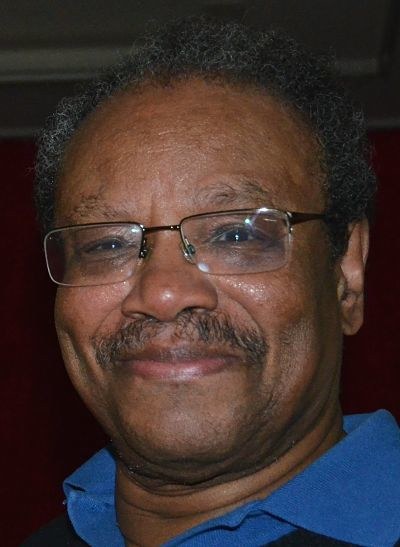The consequential changes sweeping across Europe, from immigrants impacting demographics to an increasing embrace of right-wing ideologies, are not surprising to Professor Donald Muldrow Griffith, an American who has lived in Berlin, Germany for over three decades.
Griffith, born in Chicago and respected in Berlin for his achievements as a cultural impresario, feels “tensions” are afoot in Germany and other European countries.
“Many years ago, we knew the demographics of Europe would change,” Griffith said.
“As Europeans had partaken and continue to partake in the resources of many places in the world…those persons from the ‘contributing countries’ [will] seek to come to European countries for a return on their ‘investments’ and renewed hope, as a result of the past and recent political, economic and social chaos in their countries.”
 Donald Griffith
Donald Griffith
When Griffith first settled in Berlin decades ago, that city was in the Cold War cauldron. While West Berlin was a city aligned with ‘The West’ it was located deep inside of what was then East Germany –- officially the German Democratic Republic –- a Communist ruled country that was an ally of the Soviet Union.
That East-West political divide inside Berlin had a literal reality because the city itself was split into east and west sectors since the war, and eventually by a wall built by the East German government. That barrier inside Berlin, constructed in 1961, was demolished beginning in 1990, just before the reunification of the two halves of Germany.
Griffith is an Afro-American living in a city quickly associated in the minds of most Americans with Cold War intrigues and/or World War II Nazi-era excesses. However, Griffith said race-based ugliness has not proved a major problem in either his professional or personal experiences.
“I have been fortunate to avoid unpleasantness in Europe, although one senses a change in attitude in the atmosphere, with declining economies and newcomers from various countries seeking to become a part of Europe,” Griffith said.
Griffith has made an artistic mark in Berlin, a city that does not enjoy recognition as a nourishing place for artistic expressions by Afro-Americans on par with Paris, France.
“I was and am very fortunate to have wonderful friends and family, who supported our ambitions,” Griffith said.
The ambitions Griffith referenced ignited an artistic odyssey that grew from his decision to accept an invitation to come to Berlin in 1979 to perform in a Broadway-style musical. That odyssey created a body of accomplishments that have received accolades for his elevating the recognition of Afro-American culture in Berlin.
When in Berlin for that initial acting opportunity, Griffith said he “met a group of American co-performers and a German colleague, who were interested in creating artistic works, which also addressed social issues.” He decided to stay in Berlin at the conclusion of his theater contact.
Those ambitions Griffith held grew into institutions, the first being Fountainhead Tanz Theatre, an arts and cultural organization founded in 1980. Griffith said a mission of Fountainhead Tanz is to confront violence and prejudice through various cultural activities.
Six years after the founding of Tanz, Griffith produced and directed the first European Black Cultural Festival, a three-week long event that featured the contributions of blacks to world culture through film, theater, dance, music, workshops and seminars.
That Cultural Festival included a Black International Cinema Berlin. That cinema event, now held annually, showcases films with subject matter about blacks but is not limited to black issues only. The prestigious group, Europe For Festivals/Festivals For Europe (EFFE), has ranked the Black International Cinema Berlin among Europe’s finest annual festivals.
The 30th Anniversary in 2015 of Black Cinema Berlin produced a “heartfelt congratulations” from the Cultural Attaché’ for the U.S. Embassy in Berlin. A letter from the attaché’ noted that one of the films selected for screening last year was an award-winning film that focused on Griffith’s 1986 founding of the European Black Cultural Festival. The attaché’ characterized Griffith’s Festival as “the beginnings of Black American culture in Germany.”
Griffith has taken Cinema Berlin to other cities in Europe and America. Achievements in Berlin led to the invitation from the University of Indiana in South Bend (USA) for him and his wife, ballerina Gayle, to create a dance theater department. While at that university from 1992-1995, the pair travelled annually to Berlin to produce the film festival and other cultural activities.
From Fountainhead Tanz Theatre have flowed initiatives in theater, dance, films/videos, film distribution, film festivals, musical productions, publications, seminars, exhibitions and workshops.
Another Tanz endeavor is Griffith’s hosting of “The Collegium,” a television program with a magazine-style format broadcast regularly in Berlin and other German cities.
Griffith credits his parents, a psychologist father and classical pianist mother, for inspiration along with his “mentor,” the legendary jazz vocalist/civil rights activist Oscar Brown Jr. Griffith once served as Brown’s manager.
Griffith said Brown issued a challenge to him, saying that if Griffith “wished societal adjustments,” he had to “assume responsibility for bringing those changes about.”
